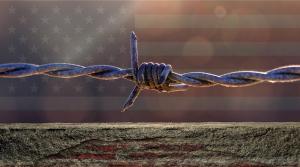
Quite a long time ago, I went to a First Holy Communion party for a friend’s daughter in a different part of the country. The daughter looked radiant in her white gown and veil; the guests were awkwardly chatting, as guests who have nothing in common but a mutual friend do at parties. Two beautiful little girls with black hair and warm brown skin were playing boisterously downstairs in the den.
My friend introduced them as Lupe and Fatima, daughters of the family next door.
“Where’s your mother?” asked my friend.
“She’s not coming,” said Lupe. “She’s scared.”
“It’s safe,” said my friend. “Tell her she has to come or I’ll cry.”
Lupe ran out of the house; she came in with a young woman with black hair and warm brown skin, who looked terrified.
My friend greeted her in Spanish. She turned to the little girls again. “Where’s your abuela?”
“Abuela’s not coming,” said Lupe. “She’s really scared.”
Abuela never did come to the party. Lupe’s mother never did relax.
Some time later, my friend explained that Lupe and Fatima’s mother was a Mexican citizen, here legally on a work permit, who worked at a local factory and lived jammed with several other Mexican families in the tiny house next door. Their father was also a Mexican citizen, here legally on a work permit, working at the factory. Most of the adults living next door were here legally on work permits. They were in abject poverty, but better off than they’d been in Mexico; they enjoyed their new living arrangement very much. The babies who had been born to the adults next door, while they were here on a work permit, had birthright citizenship and were American citizens.
Lupe and Fatima were born in Mexico, and were Mexican citizens. They didn’t have a work permit. The people who arranged for their parents to come here and work for them, expected them to leave their children in Mexico.
“Mexican culture doesn’t work like that,” explained my friend, unnecessarily. I don’t know a single culture that does work like that. Oh, there are many cultures where a rich and powerful person will expect a poor foreigner to make such a hideous decision– abandon your toddler daughter thousands of miles away, or starve– and consider himself generous for offering the choice. But I don’t know of a single person who would, if faced with such a decision, not take their daughters along. We all know that little children need to be with their parents. Family is the basic unit of society. Any force that compels families to fall apart is a force that ought to be resisted in the name of human decency. I think most everybody agrees on that. If given the choice, in the moment, if we could really see what we were doing, I think anyone would violate an unjust law to stop a beautiful, boisterous toddler from being orphaned a thousand miles away from her family.
Whether it was because of Mexican culture or simply because they were decent people who loved their daughters, Lupe and Fatima’s parents brought them to the United States. Lupe and Fatima didn’t have any choice about this. They didn’t understand about green cards, work permits or factories. They were raised in that house, as Americans in every sense but the legal one. They learned to speak English as their primary language. They went to American public schools. They had a younger brother who was himself an American citizen. Being American was the only life they knew. They didn’t have any memory of Mexico.
Some years later, I saw my friend again. I asked about her neighbors.
“They got raided,” she said flatly. “We tried to hide them, but Immigration took one of their children.”

















